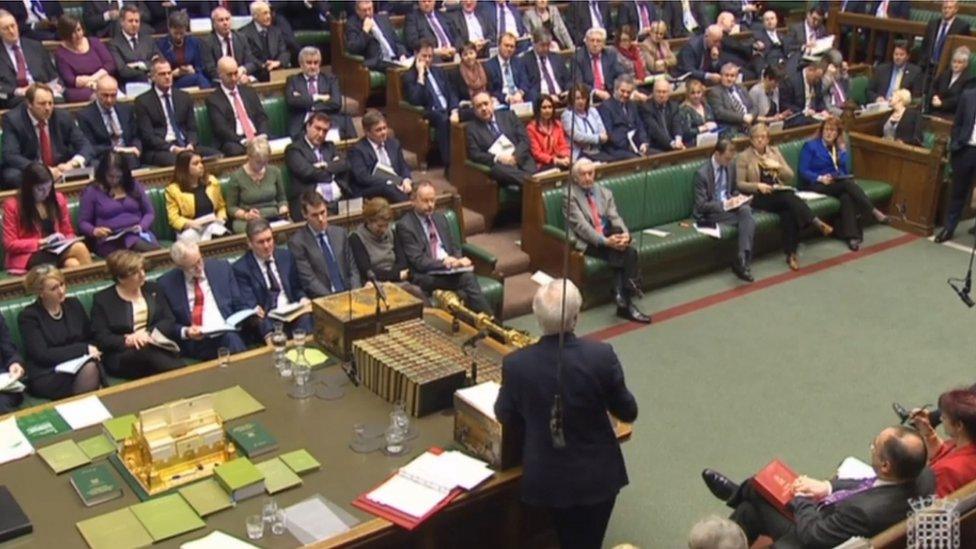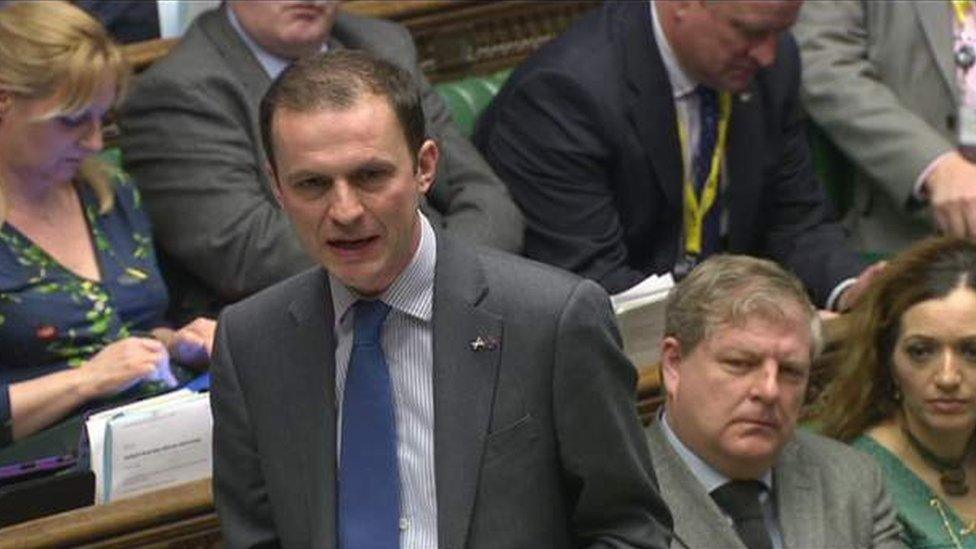SNP MPs attempt to block Brexit bill
- Published

The UK government's Brexit secretary, David Davis, called on MPs to "respect the will of the people"
The SNP is attempting to block the UK government's bid to formally begin the process of leaving the European Union.
The House of Commons is debating the legislation that would trigger Article 50.
The SNP - which has tabled a motion that would delay the bill - and Liberal Democrats are opposed, but Labour leader Jeremy Corbyn has ordered his MPs to vote with the government.
However some Labour MPs are expected to defy Mr Corbyn.
The government remains determined to trigger negotiations on the UK's withdrawal from the European Union by the end of March.
But the SNP's amendment to the European Union (Notification of Withdrawal) Bill criticises the government for failing to consult effectively with the devolved administrations on the plans for Brexit.
It also says the government has yet to publish a White Paper detailing its policy proposals, has refused to give a guarantee on the position of EU nationals in the UK, and has provided no assurance that a future parliamentary vote will be anything other than irrelevant.
Detailed plans
Speaking as he outlined the amendment, SNP MP Stephen Gethins said triggering Article 50 would have a major economic impact on Scotland.
He argued that the only detailed plans for Brexit had been published by the Scottish and Welsh governments.
And he said Scotland had voted to Remain and was now being taken out of the EU by a Conservative Party that just posted its worst general election result since 1865 in Scotland.

Stephen Gethins criticised the UK government's handling of the Brexit process
Mr Gethins said: "Passing this bill and turning your back on our amendment would turn its back on the progress made and disrespect the devolution settlement.
"I'd urge members to vote for our amendment, otherwise this is a backward and damaging step and it is an act of constitutional and economic sabotage."
Mr Gethins found an unlikely ally in former Tory Chancellor Ken Clarke, who said he would be "voting with his conscience" and backing the SNP amendment.
Mr Clarke described visions of a post-Brexit future as a "wonderland" fantasy.
He also mocked the government's hopes for free trade after leaving the single market, and claimed that "no sensible country has referendums".
Clarke: Brexit hopes 'like Alice in Wonderland'
The government had resisted having a vote in the Commons, but was forced to seek parliament's approval for its plans by a Supreme Court ruling last week.
Its Brexit secretary, David Davis, told the debate that MPs would not be able to vote to block Brexit, telling them the "point of no return" had already passed.
He added: "This is not a bill about whether the UK should leave the EU or indeed how it should do it.
"It is simply about parliament empowering the government to implement a decision already made, a point of no return already passed.
"We asked the people of the UK if they wanted to leave the EU. They decided they did. So at the core of this Bill lies a very simple question. Do we trust the people or not?
"We will respect the will of the people and implement their will by 31 March."
'Difficult decision'
The debate is due to last two days, with the government expected to win the final vote - although the size of the rebellion by Labour MPs against their instructions to vote with the government is not yet clear.
Labour's Brexit spokesman, Sir Keir Starmer, said two thirds of Labour MPs represented constituencies that voted to leave the EU, and one third where people voted to stay in.
"This is obviously a difficult decision," he said.
"I wish the result had gone the other way. I campaigned passionately for that. But as democrats our party has to accept that result and it follows that the prime minister should not be blocked from starting the Article 50 negotiations."